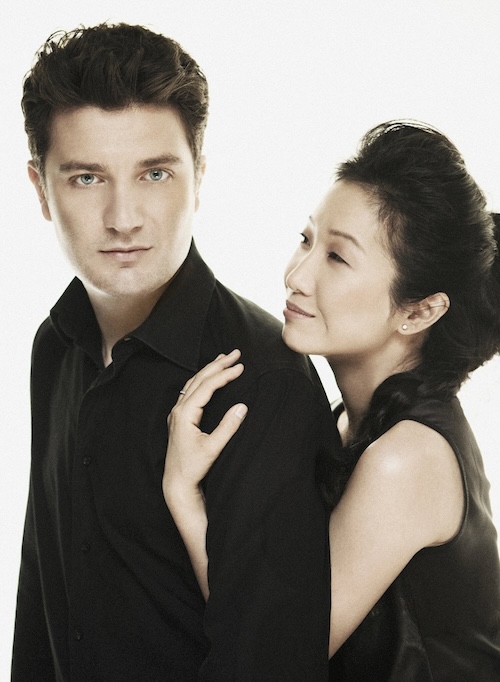Bax and Chung in sync partners for two-piano recital at Wolf Trap

Pianists Alessio Bax and Lucille Chung performed Sunday at Wolf Trap.
The piano contains such a world of sound unto itself that pianists do not always adapt well to playing music for two pianos. Time and familiarity with one’s partner are needed to make the adjustment to this special brand of ensemble playing.
Alessio Bax and Lucille Chung, a piano duo who are also married to each other, showed how it is done in a fine two-piano recital Sunday afternoon in the Barns at Wolf Trap. Special praise for a program that featured only one perennial favorite of the repertoire, Ravel’s La Valse, alongside some rarely heard surprises.
The musicians opened with Ferruccio Busoni’s daunting Duettino Concertante nach Mozart, a whirlwind display based on the Finale of Mozart’s Piano Concerto No. 19. The piece pulsated with brisk activity throughout, and the coordination, especially, of running 16th notes required constant focus. Of the two pianists, Bax seemed the more sure-footed in these ornate passages, seated in this piece at the second piano.
Even more challenging was Poulenc’s Concerto for Two Pianos, played in the arrangement incorporating as much of the orchestration as possible into the two solo keyboard parts. Chung and Bax, again on primo and secondo, respectively, delivered zany energy in the circus-tinged opening to the first movement. Later slow sections provided distinct contrasts, a late-night bar’s smokiness in one and a forlorn music-box innocence in another. The jabbed short notes at the end, always tricky to align, came off with natural grace.
In the polystylistic swirl of the piece, characteristic of much of Poulenc’s music, a strong whiff of Mozart perfumed the slow movement, played with sentimental indulgence. The duo bravely pressed the tempo to helter-skelter levels in the closing third movement, with the repeated-note motifs a crazy jumble. So much is packed into this score, presented at times with a jarring sense of mockery, that the ear had trouble finding a clear line through it.
After intermission came two moments of respite, one cerebral and the other sentimental. Robert Schumann composed his Six Canonic Studies for a piano outfitted with a pedal-board attachment like an organ. Such devices being rare in later times, Claude Debussy arranged these enigmatic, sometimes academic pieces for two pianos.
Here for the first time in the concert, Bax took the primo part, applying his ringing right-hand melodic touch to the lead part in the many contrapuntal exchanges between pianos, echoed gently by Chung. Tributes to Bach abounded, not least in the fugue of the sixth piece. Mostly the mood remained introspective, except for the fifth piece, which sounded rather playful at a bright but still relaxed tempo.
The duo swapped out the four-hands arrangement of Debussy’s La plus que lente, originally in the program, for the composer’s beloved “Clair de Lune” from Suite Bergamasque, in the arrangement for two pianos by Henri Dutilleux. Back on the secondo part, Bax played the delicate opening of the piece, to which Chung added the primo part with an organic sense of growth. Generous use of the pedals helped create a delicate web of sound from the two pianos.
The program concluded with Ravel’s two-piano transcription of La Valse, intended as a ballet score but eventually subtitled “poème chorégraphique.” Out of the score’s murky opening section, dominated by an ominous half-step motif reminiscent of the Jaws soundtrack, Bax led a tumultuous rendition, back on the primo part once more. Explosive outbursts of sound piled up, featuring booming bass octaves, swirling roulades, and boozy glissandi. A thrilling accelerando powered the conclusion, creating a carefully paced sense of the dance veering out of control, a fitting end to a daring program.
Wu Han, in her final performance as Wolf Trap artistic advisor, anchors a Chamber Music Society of Lincoln Center program, culminating in Schubert’s “Trout” Quintet 3 p.m. March 16. wolftrap.org
